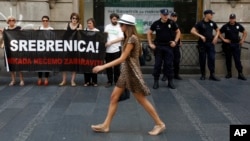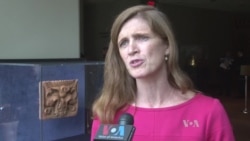Russia blocked adoption Wednesday of a U.N. resolution commemorating the 20th anniversary of the genocide at Srebrenica in the former Yugoslavia.
The U.N. Security Council vote was 10-1. Four Security Council members, Angola, China, Nigeria and Venezuela, abstained.
Power speaks out
U.S. Ambassador Samantha Power said the resolution did not even name a perpetrator, and she scolded the Russians for not wanting to reference “Srebrenica” and “genocide."
“Today because of Russia’s refusal to call what happened in Srebrenica by its rightful name -- genocide – the Council is again failing to live up to its responsibility.”
Watch Interview With US Ambassador to UN Samantha Power
“Russia can do what it wants, clearly, in the Security Council as a permanent member, but it can’t veto the truth,” Power said. “The facts of the genocide in Srebrenica have been established by hundreds of thousands, if not millions of pages of photographic evidence, witness testimony and the actual physical remains of more than 6,000 victims so far.”
Power, a former journalist (1993-1996), who also covered the Yugoslav wars for U.S. News & World Report and other U.S. publications, added that “Bosnian people and the families of those who suffered should know that that’s the case and all that happened today with Russia showed its isolation in the international community and showed that genocide denial is the enemy of reconciliation.”
Genocide
The Srebrenica massacre was Europe's worst genocide since World War II. An estimated 8,000 Muslim men and boys died in a series of mass killings spread over 11 days in July 1995 during the Bosnian war. Russia has been a traditional ally of the Serbs.
Russian Ambassador Vitaly Churkin called for a moment of silence to honor the victims of “atrocious crimes” committed in and around Srebrenica, and then proceeded to wield his veto to block adoption of the draft resolution which focused on genocide prevention and reconciliation. He is heard here through an interpreter.
“The draft submitted by the United Kingdom turned out to be not constructive, confrontational and politically motivated. It contained distortions, as a result of which, the blame for the past is placed basically on one people,” said Churkin.
Churkin said Russia proposed its own, more balanced text, but that it was ignored. Drafting of the resolution began a month ago and the vote was scheduled to happen Tuesday, but council members delayed it so negotiations could continue with Russia to try to reach a compromise.
British Ambassador Peter Wilson, whose delegation authored the draft, said his government is “outraged” that Russia opposed it, and that Russia’s actions tarnish the memory of all those who died in the Srebrenica genocide. Srebrenica was a mainly Muslim town in a Serb-held part of Bosnia-Herzegovina.
Two international courts have called the Bosnian Serb slaughter of 8,000 Muslim men and boys at a U.N. enclave protected by Dutch troops a genocide.
Russia, Serbia and the Bosnian Serbs called the resolution divisive.






